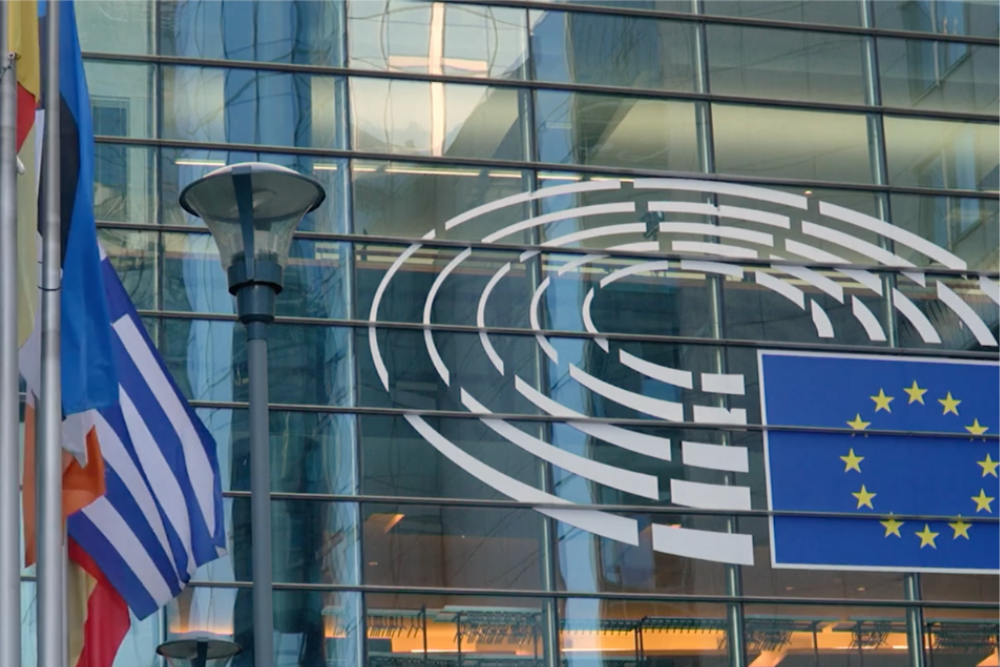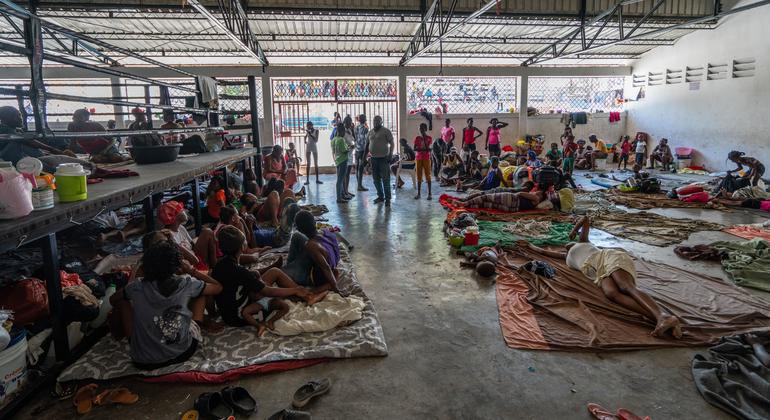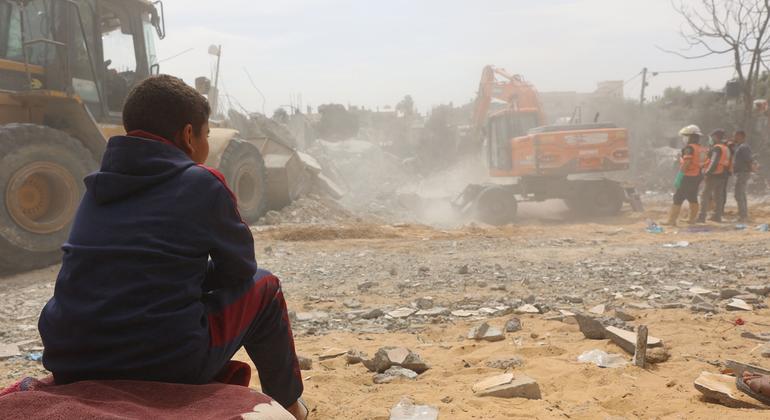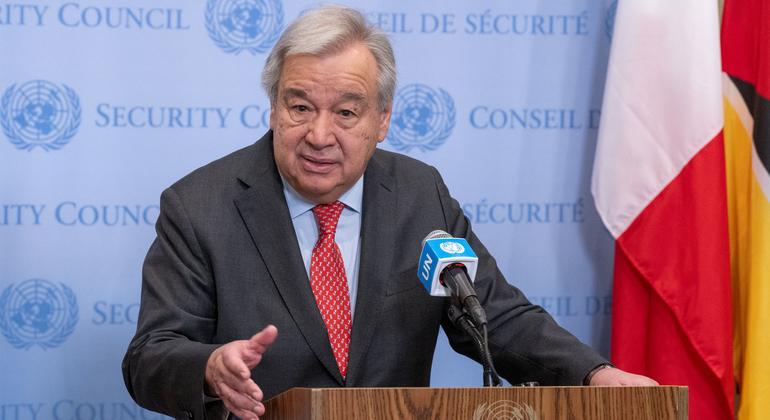“The scale of human rights violations is unprecedented in Haiti’s modern history,” Volker Türk said in a video statement to the UN Human Rights Council, part of an interactive dialogue on his most recent report on the Caribbean country.
“This is a humanitarian catastrophe for an already exhausted people.”
State of emergency
Speaking in French, Mr. Türk said the already alarming situation in Haiti has deteriorated in recent week as gangs launched attacks against police stations, prisons, critical infrastructure and other public and private facilities.
A state of emergency is in effect but while institutions are collapsing, a transitional government is not yet in place following the resignation of Prime Minister Ariel Henry three weeks ago.
“The Haitian population cannot wait any longer,” he said.
Record violence
Meanwhile, escalating violence has had devastating impacts on the population, with a shocking increase in murders and kidnappings.
Between 1 January and March 20 alone, 1,434 people died and 797 others were injured in gang-related violence. Mr. Türk said this was the most violent period since his office began monitoring gang-related killings, injuries, and kidnappings more than two years ago.
Sexual violence, particularly against women and girls, is pervasive and has most likely reached record levels.
More than 360,000 Haitians are now displaced, and roughly 5.5 million, mainly children, are dependent on humanitarian aid. Although 44 per cent of the population is facing food insecurity, delivery of additional aid is becoming almost impossible.
Mr. Türk recalled his visit to the capital Port-au-Prince just over a year ago, where he met two young girls. One had been gang-raped and the other had survived a bullet to the head. He warned that an entire generation is at risk of being victims of trauma, violence and deprivation.
“We must end this suffering. And we must allow the children of Haiti to know what it is to feel safe, to not be hungry, to have a future,” he said.
Protect people, ensure aid access
In his report, the High Commissioner called for restoring some degree of law and order as an immediate priority to further protect Haiti’s people from violence and ensure access to humanitarian assistance.
This will require close cooperation with the Multinational Security Support (MSS) Mission, authorized by the UN Security Council last October, whose deployment he hoped was imminent.
“All measures taken to restore security must fully comply with human rights standards,” he said, adding that “humanitarian corridors must be established as soon as possible.”
Give Haitians hope
Mr. Türk urged all stakeholders in Haiti to put the national interest at the heart of their discussions so that agreement can be reached on the arrangements for the transitional government.
“The transitional authorities must strive to create the conditions necessary for free and fair elections to be held. They must also begin the process of strengthening police and judicial institutions in order to reestablish the rule of law and, therefore, put an end to impunity,” he said.
The protection of children must also be an absolute priority, including those recruited by armed gangs. In this regard, he highlighted the need for reintegration programmes, including prolonged psychosocial support as well as guaranteed access to quality education and healthcare.
He also called for the international community to take stronger measures to prevent the illicit supply, sale, diversion or transfer to Haiti of light weapons, small arms and ammunition.
“It is time to end the political impasse, urgently rebuild peace, stability and security in the country, and give Haitians the hope they so desperately need,” he said. Check out our UN News explainer video from last week on the crisis:
Turn words to action: Haiti representative
The Permanent Representative of Haiti to the UN in Geneva, Justin Viard, hailed the High Commissioner’s report and underscored the deep challenges that Haitians are facing.
He stressed that the international community and Haiti must act together to address both the gangs and the root causes of the crisis, which include widespread unemployment, a failing educational system and food insecurity.
“We must move from words to concrete actions,” he said. “We cannot allow for Haiti to one day show up in a page of history as an example of the powerlessness of the international community or the abandonment of the population of a UN Member State.”
Strengthen human rights
The UN Deputy High Commissioner for Human Rights, Nada Al-Nashif, was in the room to answer questions from country and civil society representatives.
She spoke of engagement around the UN-backed multinational support mission that will assist the Haitian National Police to ensure that it complies with relevant international human rights standards.
“All this means that the capacities of the human rights service will require more strengthening in certain areas, particularly, for example, violence against children,” she said.
No escape: rights expert
The High Commissioner’s designated expert on the human rights situation in Haiti, William O’Neill, was also present to respond to questions, noting that insecurity was the chief concern raised and “everything else flows from that.”
He said the airport in Port-au-Prince has been closed for more than four weeks, while gangs control access to all major roads in and out of the city, meaning that “there is no escape – air, land or sea”.
Mr. O’Neill reported that Haiti’s largest hospital has basically been emptied out, “and today we heard that a gang has overtaken and taken over the whole premises, what’s left of it.”
Support Haiti’s police
Highlighting the deployment of the UN-backed multinational mission, he emphasized its supporting role, stating that it is “not an occupation”.
Although the mission will boost Haiti’s police, he said the national force will also need intelligence support, assets such as drones, and the means to intercept gang communications and halt illicit financial flows to them.
“They need some vetting,” he added. “There’s some Haitian National Police, unfortunately, that are still in connivance with the gangs and that’s got to be addressed.”
The justice system, currently “on its knees”, will also need assistance with investigating and prosecuting gang leaders when it is back to functioning.
Stop the slide
Echoing the UN human rights chief, Mr. O’Neill urged countries to work to stop the flow of arms and ammunition to Haiti’s gangs. He noted that some representatives also pointed to the need for sanctions against the people who sponsor the gangs.
“If we take those three measures – the support service for the police, sanctions, arms embargo – we begin to maybe turn around the momentum in a positive direction and stop it from this slide that we’ve seen intensify over the last few weeks,” he said.
The rights expert also called for greater support for the $674 million humanitarian appeal for Haiti which is currently around seven per cent funded.














